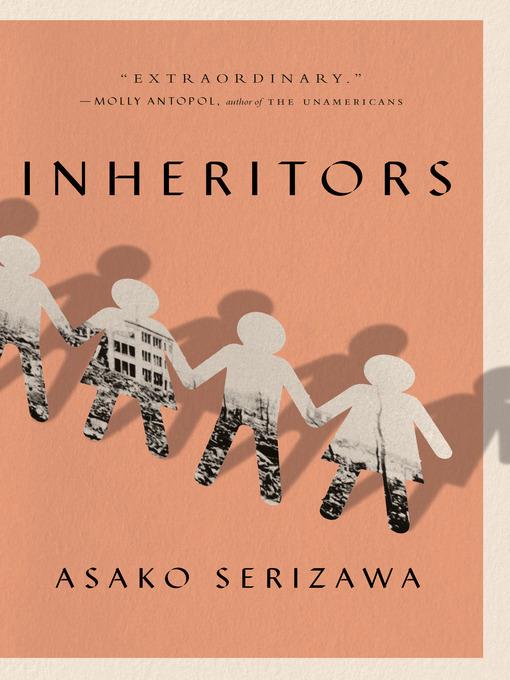
Inheritors
- اطلاعات
- نقد و بررسی
- دیدگاه کاربران
نقد و بررسی

May 15, 2020
The past spills out into history and encroaches on the future in Japanese-born, Boston-based writer Serizawa's first book of short stories. Two poles dominate Serizawa's short fiction: Japan and the U.S. (California in particular). One historical event looms over both: the war between Japan and the U.S. in the 1940s, an event that, she writes in an author's note, "didn't start and end with specific people and events; its roots reach back to values seeded long ago, and its sundering effects have hardly lost their spark and propulsion." Her characters aren't always sure what those values are. One woman, resolutely of the present moment in the era of "Neoliberal Self-Destruction," disappears at the end of a looping mystery, perhaps a member, perhaps the very embodiment, of a group called Bakteria, which "leaked a trove of undeclassified material related to a Japanese bacteriological warfare unit from the Second World War, whose crimes the U.S. government had notoriously helped cover up, shielding its members in exchange for their data harvested from human experimentation." Was her disappearance a prank, a kidnapping, a CIA plot, an act of terrorism? We're left to guess. In another story, some of the last pilots of the Imperial Army, knowing that they won't return, lift off into the sky to "meet several hundred enemy fighters," dutifully plunging like so many Icaruses into the ocean. A Japanese woman recalls the hoods that she and her neighbors wore to protect themselves from American firebombing: "they were just padded pieces of cloth, another thing our government cooked up. Still, we put them on, you know, half of us running around with our hoods on fire." Serizawa writes elegantly if matter-of-factly of the horrific and the nostalgic alike, as when one narrator recalls a childhood visit to her grandparents in Japan, learning an ancient ritual: "clapping her hands three times and pressing her palms together, eyes closed, a prayer for Fuji-san, his mountain god. Keeper of health." Cultures collide and sometimes meld in an assured debut.
COPYRIGHT(2020) Kirkus Reviews, ALL RIGHTS RESERVED.

Starred review from June 1, 2020
Serizawa follows a winding maze through a Japanese family’s history in her dynamic debut collection. A family tree beginning with Masayuki (born in 1868) and continuing through to Mai (born in 2013) creates the work’s backbone, as Serizawa constructs a nonlinear narrative filled with abrupt turns, accidental betrayals, and supposed curses and myths. The opening story, “Flight” (covering 1911–1981), follows Masayuki’s daughter, Ayumi, as she loses some of her memories while others become more vivid. In the collection’s standout, “Train to Harbin,” Ayumi’s doctor brother contemplates his youthful nationalism in the years just after WWII and his role in the wartime occupation of China. In “Luna,” set in 1986, Ayumi’s Japanese-American grand-niece Luna learns her father, Masaaki, was adopted and is of Korean heritage (not Japanese, as he believed), leading her to recall her earliest memories of visiting Japan. In “Passing,” set in 2010, Luna returns to Japan to collect Masaaki’s possessions and ruminates not on “where he belonged” but “how he wanted to fit in.” The final two stories, “The Garden” and “Echolocation,” jump into the future to investigate the fallacies of perception and what cyber warfare might look like after Mai’s brother, Erin, develops a global VR climate simulator for predicting disaster. By showing Japan as both colonizer and colonized, Serizawa delivers an elegant, stimulating web of stories.

July 1, 2020
In this stunning debut, O. Henry Prize-winning author Serizawa tells the stories of one Japanese family, spanning five generations during and after WWII. Luna is a six-year-old American girl visiting her paternal grandparents with her family in western Japan. During the trip, her parents' cultural differences, as well as their conflicting views of identity, become more apparent. In Japan after the war, Masaharu follows his wife to her place of work and is confronted by the sacrifices she makes in order to provide for their family. An elderly woman tries to tell her story as a former Japanese prostitute for white foreigners and American soldiers, but she finds the interviewer more interested in manipulating her story to fit her own agenda. Tanaka is a successful young soldier who makes the ultimate sacrifice for the Imperial Japan. With beautiful lyrical prose, Serizawa presents a powerful and heartbreaking look into the ways war, colonization, and loss affect not only the survivors, but the generations that inherit these stories.(Reprinted with permission of Booklist, copyright 2020, American Library Association.)

September 1, 2020
DEBUT "Later, Luna will learn words like 'biculturalism' and 'fracture' to explain the pain that will skim her heart whenever someone mentions something that reminds her of summer in Japan," and that pain quietly saturates this masterly debut collection from the O. Henry Prize-winning Serizawa. Though each is entirely distinctive, the stories are linked--partly by family connection, as indicated by a family tree in the opening pages, but more by issues of heritage, identity, and the burdens of the past. A Japanese woman who raised three biracial children in America post-World War II is glad to be losing her memories, while Luna's father abandons his American family after taking them to Japan to visit his ailing father, only to learn an unsettling truth about his origins. Other stories dwell pointedly on the tensions of the American Occupation. VERDICT A seamless collection illuminating cross-cultural consequences.
Copyright 2020 Library Journal, LLC Used with permission.




دیدگاه کاربران